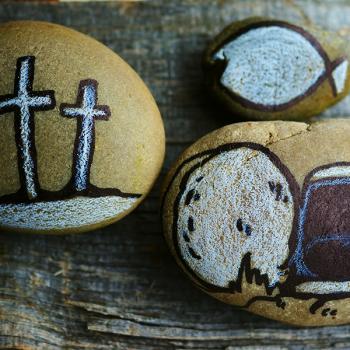Begin to see the eyes and ears and mouth of these images as the eyes and ears and mouth of Antinous. Honor the god through the image in whatever way you feel is most appropriate. Sing him hymns, speak your prayers aloud to him. Antinous has never been claimed as an omniscient deity, and thus he cannot hear your silent thoughts or look into your heart and see your intentions; you must speak them aloud. He can even intercede for you on behalf of other gods, particularly those to whom he was syncretized, or with whom he had some relation—the Egyptian gods Thoth, Re-Harakhte, and Hapi fall into the latter category, for example. And, apart from that, start keeping your senses sharp for where he may appear in your life to inspire you or communicate with you in your daily activities, particularly in dreams, where he will often turn up (and has done so from the earliest times of his cultus). One of the epithets Antinous shares with Dionysos is Epiphanes, "he who comes/arrives," and so being prepared for unexpected epiphanies is a good thing to keep in mind when engaging in a cultic relationship to this particular god.
I know that there were hero cults within ancient religions, particularly within Hellenic and Roman faiths. Does that play a significant part in contemporary Roman or Hellenic Pagan worship? In your opinion, should it?
I have seen precious little indication of modern interest in hero cultus within Hellenic and Roman practices, which is sad, though I also freely admit that I'm also not much a part of mainstream Hellenic or Roman Pagan practices. Herakles/Hercules is often worshipped as a god in the modern period, but he was one of these liminal figures, who was both a hero and a god. Achilleus, on the other hand, is generally not worshipped as a hero, despite ample evidence of such in the ancient world; read Philostratus's Heroikos if in doubt! Much of this goes back to what I said above about the worry that worshipping mortals is somehow "wrong," I think; but there is also the common confusion of what it means to have hero cultus or hero-worship.
Ancient hero-worship is not screaming in line at the cinema over Robert Pattinson or idolizing Justin Bieber...though, note, the terminology is often rather similar (e.g. "idolize"). The objects of hero cultus were considered heroes or heroines because of what they did and the virtues they upheld in their lives; they were not utter perfection, in the way that Christian saints are often said to be, but they served an important function for their devotees or the communities that were indebted to them as founders or saviors. A good way to think of heroes within hero cultus is as a particularly important class of deified ancestors, the mightiest of the mighty dead one might even say. They are often people without whom one cannot imagine doing what one is doing now.
While I think that this kind of ancient hero cultus continuation would potentially be of great benefit to many Hellenic and Roman practitioners, I think developing similar systems within other traditions would be very useful as well. The Irish heroes Cú Chulainn (with whom I've had a hero cultic connection to for some time) and Finn mac Cumhaill, for example, would be perfect for hero cultus, since we know more and have more surviving tales about them than we do about any of the Irish or Welsh deities. While I am not as informed on the specific details on the following as I am in other areas, I'm pretty sure there must be figures in Germanic legend who are not gods, but who would be worthy of honoring as heroes at least on a yearly basis with a blót, at very least. The same is true of many other traditions the world over.
Thank you for that explanation. I think it was perhaps the clearest and most comprehensive explanation of hero cultus that I've ever had the pleasure of reading. To continue, where would you like to see your community go in the next decade?
I've been involved with the modern worship of Antinous since the summer of 2002, so this is going into my ninth year of it. On October 30, 2010 I celebrated the ninth Foundation Day ritual that I've ever done, which is the most important ritual of our sacred year. Last year was an important anniversary for the historical cultus, because on November 27, 110, Antinous was born. I had hoped at this stage of our modern cultus that there would be organized and sizeable communities, public temples, and major recognition; I've never been one to think modestly about such things! However, that isn't the case at present, though I am pleased with where we've come and what we've done up until this point. In 2030, on October 30, we will have the 1900th anniversary of the deification of Antinous and the beginning of his cultus. By that time, with any luck, we'll see some of these things, or at least the beginnings of them. While it is only twenty years away, I may or may not still be around to see it; but if I am, I hope that some of these things will have taken place.





